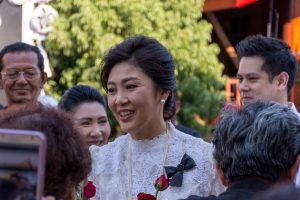A Thai court yesterday ordered former Prime Minister Yingluck Shinawatra to pay 10 billion baht (around $305 million) in damages over an ill-fated rice pledging scheme, complicating, perhaps for the long term, her bid to return to Thailand from self-exile
According to the Associated Press, the Supreme Administrative Court partially reversed a 2021 court ruling that cleared Yingluck, who is currently living in self-exile, of having to pay any damages. In 2016, the Finance Ministry had ordered the former PM to pay 35.7 billion baht ($1.1 billion) to offset losses from the rice scheme, which helped get Yingluck’s Pheu Thai party elected in 2011.
In yesterday’s ruling, the court ruled that Yingluck, 57, was guilty of severe negligence in relation to rice sales to other countries and said that she had “failed to act on many government agencies’ warnings of possible corruption,” the AP reported. But it said that she was not liable for the full 35.7 billion baht claimed by the Finance Ministry, since there was insufficient evidence to prove that Yingluck was directly responsible for the damage caused by the rice pledging scheme.
The rice scheme aimed to boost farmers’ incomes by buying rice at prices around 50 percent higher than market prices and then warehousing the grain. While the scheme was popular with Pheu Thai’s rural support base, it cost the state billions as it led to millions of tons of rice to molder in government storage facilities.
Yingluck was overthrown in a military coup in May 2014, and the rice scheme was immediately terminated by the military government, which described it as an irresponsible populist handout to Pheu Thai’s voter base. In August 2017, Yingluck fled the country, joining her brother, former Prime Minister Thaksin Shinawatra, in self-exile, a month before the Supreme Court sentenced her to five years in prison for negligence in the management of the rice subsidy scheme. Thaksin, too, was overthrown by a coup in 2006 and fled abroad to escape corruption charges in 2008.
In a statement posted yesterday on Facebook, which also marked the 11th anniversary of the coup that removed her from power, Yingluck claimed that she was a victim of political injustice. “I am being held responsible for a debt I did not create,” she wrote, according to The Nation. “I was the head of the executive branch, forced to bear liabilities caused by operational officials, in which I had no direct involvement.” Her lawyers plan to appeal the ruling.
Insofar as the rulings of the Thai judiciary reflect the prevailing political winds, yesterday’s verdict is a sign of a further weakening of the political pact that brought Thaksin home from self-exile in August 2023. The pact resulted from the political realignment that followed the general election of May 2023, which saw the progressive Move Forward Party (MFP) win a plurality of seats.
When the military-appointed Senate closed ranks to block the MFP from forming the government, Pheu Thai formed a coalition that included several conservative and military-backed parties that had long opposed Thaksin. As part of the agreement, Thaksin was permitted to return home, and Yingluck was widely believed to eventually follow.
Things did seem to be moving in this direction until recently. In December 2023, a court cleared Yingluck of abuse of power in connection with a personnel transfer that she had overseen while in office in 2011. Last year, she was also cleared on unrelated charges of mishandling funds for a government project in 2013.
But the pact that brought Thaksin home has seemingly fractured amid the Pheu Thai government’s weak performance, Thaksin’s return to political prominence, and increasing challenges from Bhumjaithai, the most powerful conservative party in the coalition. As Patrick Jory wrote for The Diplomat earlier this month, the political agreement with the conservatives has not erased their deep mistrust toward Thaksin, who has consequently “been kept on a tight leash.”
Accordingly, the legal challenges against Thaksin himself are mounting. He still faces lese-majeste and computer crimes charges relating to comments he made in an interview with a South Korean newspaper back in 2015. He is also due to appear in the Supreme Court on June 13 in connection with its investigation into the six-month hospitalization that followed Thaksin’s return to Thailand in 2023 and whether the serious health issues that allowed him to avoid imprisonment were either confected or significantly exaggerated.
As things stand, the pathway to Yingluck’s return, and the abrogation of the five-year prison sentence she still faces, remains a remote prospect under this administration.

































